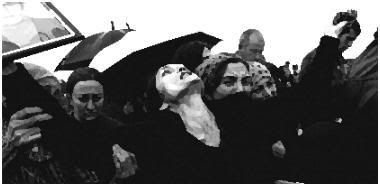
Supreme Court Chief Justice Reynato Puno joins a long list of global public figures who stepped out of the dark and acknowledged the reality of terrorism, including Peter Munya, the US Conference of Catholilc Bishops, John Edwards, Hugo Chavez, Fernando Lugo, Desmond Tutu, Charles Dickens, Muhammed Yunus, myself, and even Pakistan dictator Gen. Pervez Musharraf who have been saying that you can't win a war on terror if you don't fight a war on poverty. For the record, the late Holy Father Pope John Paul II believed this too.
Puno criticized the "mindless" war on terrorism at the expense of civil liberties, and -- referring to the Philippines, but relevant to the US under the Bush administration -- said a state with credibility problems could not adequately protect the rights of its citizens. He said the fight against terrorism had been "more discomforting" than the terror itself.
Terrorism is terrible enough, but the mindless, knee-jerk reaction to extirpate the evil is more discomforting. One visible result of the scramble to end terrorism is to take legal shortcuts and legal shortcuts always shrink the scope of human rights. These shortcuts have scarred the landscape of rights in the Philippines.Puno said that the institutional forces of anti-terrorism engage in much flag-waving, singing of the national anthem and issuing "high-pitched" directives to military forces, the police, and citizens to use their weapons for victory at all costs. But, he said, enough is enough. Security is meaningless at the expense of individual liberty.
To put constitutional cosmetics to the military-police muscular efforts, lawmakers usually enact laws using security of the state to justify the dimunition of human rights by allowing arrests without warrants; surveillance of suspects; interception and recording of communications; seizure or freezing of bank deposits, assets and records of suspects. They also redefine terrorism as a crime against humanity and the redefinition is broadly drawn to constrict and shrink further the zone of individual rights.Puno urged political leaders -- but the appeal might be read by all of us, if we choose -- to have a broader view of terrorism, saying poverty is also a form of terrorism and the poor suffer more by their poverty than by violence.
In poor countries, it is poverty that truly terrorizes people for they are terrorized by the thought that they will die because of empty stomachs and not that they will lose their lives due to some invisible suicide bombers...The apathy of those who can make a difference is the reason why violations of human rights continue to prosper. The worst enemy of human rights is not its non-believers but the fence sitters who will not lift a finger despite their violations...Sooner or later, they will find that they who default in protecting the rights of the many will end up without rights like the many...With the incursions and threats of incursion to our human rights at this crucial moment in our history, the clarion call to each one of us is to consecrate our lives to the great cause of upholding our human rights.

No comments:
Post a Comment